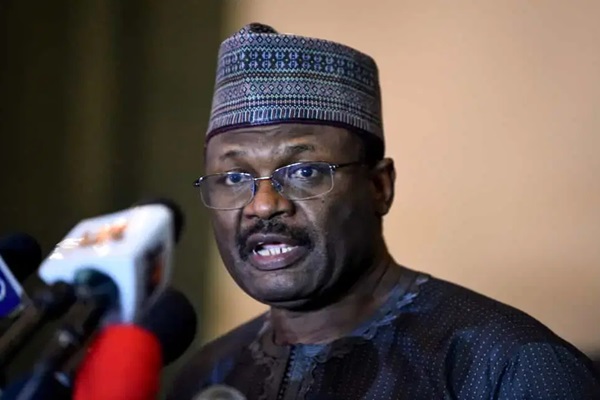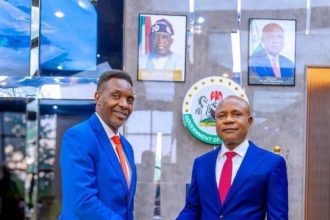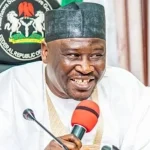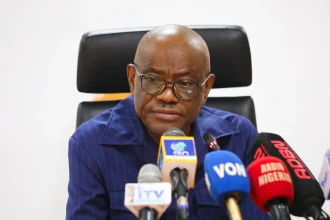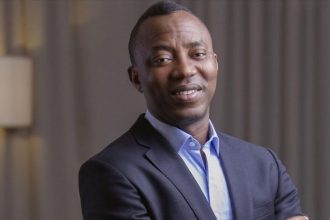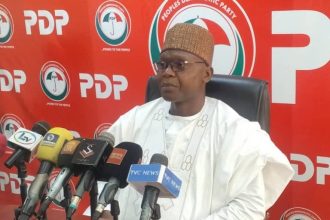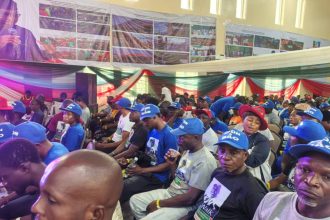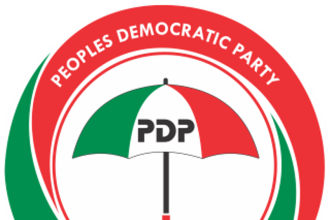- ‘Nine National Commissioners to quit before 2027’
As the chairman of the Independent National Electoral Commission (INEC), Prof. Mahmood Yakubu, bows out, the nation expects another man or woman of impecable character to succeed him.
No fewer than nine National Commissioners are also expected to leave before the 2027 general election.
The implication, said Samson Itodo, Executive Director of Yiaga Africa, is that the polls may be conducted by a new electoral team, if four of them who are eligible for re-appointment, are not retained.
Itodo, who spoke of Channels Television, hailed Yakubu, describing him as an umpire of reforms. He acknowledged the innovations due to automation, particularly the BIVAS and IREV, which his successor should build upon.
Itodo noted efforts by Yakubu to prevent electoral irregularities through inbuilt security devices into the electoral process which are not known to the public.
He noted that he also did not condone nonsense among other electoral officers, some of whom are currently being prosecuted in the court for aiding and abetting malpractices.
But, Itodo said the outgoing chairman is leaving behind a weak electoral agency, clarifying that this is not due to his management style.
In his view, INEC chairman and Resident Electoral Commissioners are still being appointed by the president, adding that allegations of appointing partisan people are still rife. Although the president is constitutionally mandated to consult the Council of State on the appointment of the chairman, he may not be bound by their intervention which is merely advisory.
Besides, Itodo alleged under-funding of the commission. He said the funds for 2023 polls were not released completely. That may be the reason for the delayed conduct of by-elections, he added.
When he handed over the baton to Acting Chairman May Agbamuche-Mbu on Tuesday, the outgoing chairman spoke on the task before the electoral agency ahead of future polls.
He said: “Today’s meeting is holding in the middle of the nationwide Continuous Voter Registration (CVR) which started seven weeks ago. Since then, the Commission has been publishing weekly figures of the exercise with detailed breakdown by States of the Federation, gender, age, occupation and disability.
“The latest figures published yesterday show that 6,856,979 Nigerians commenced their registration online (the pre-registration option) while 1,216,048 completed the process (the physical or in-person option). The exercise will continue until August 2026 when it will be suspended not later than 90 days before the date fixed for the general election, as provided by law.
“There are a number of forthcoming elections. The preparations for some of them are either at advanced or concluding stages. The Anambra State governorship election is holding next month, followed by Area Council election in the Federal Capital Territory (FCT) in February 2026, the Ekiti State governorship election in June 2026, and the Osun State governorship election in August 2026.”
INEC will be involved in the primaries in Ekiti and Osun as observer. The shadow polls are already gathering momentum.
The 2027 electioneering started almost immediately after the 2023 polls. INEC has no means of preventing early campaigns by politicians who transform ordinary party meetings into endorsement rallies and mobilisation platforms.
Section 94(1) of the Electoral Act 2022 clearly prohibits the commencement of campaigns earlier than 150 days before the poll day, and requires all campaign activities to end 24 hours before voting begins.
However, Yakubu lamented that political actors often disregard this provision, adding:“Political parties, candidates and their supporters seem to be perpetually in election mood even when the Electoral Commission is yet to release the Timetable and Schedule of Activities for elections.”
He stressed: “Around the country, we have seen outdoor advertising, media campaigns and even rallies promoting various political parties and candidates,” the INEC Chairman noted.
The chairman warned that these premature activities compromise INEC ‘sability to enforce campaign finance limits.
He said: “These actions and activities undermine the commission’s ability to track campaign finance limits as politicians, prospective candidates and third-party agents expend large amounts of money that cannot be effectively monitored before the official commencement of campaigns.”
Yakubu said the electoral system has to be continuouly strengthened by legislations. If the reforms are backed by law, he believes that the INEC would be further fortified to deliver good elections.
Yakubu stressed: “In addition to these off-cycle elections, we have already commenced preparations for some of the major activities for the 2027 general glection, while awaiting the enactment of a new Electoral Act. The Bill is currently before the National Assembly.
“It is expected that electoral reforms contained in the new Act will necessitate further review of our Regulations and Guidelines as well as the Manuals for Elections. Beyond these reviews, the Commission needs to further clean-up the voters’ register, review the locations of some of the polling units and the allotment of voters to them.”
On shadow polls, Yakubu said: “The management of party primaries is another major area of activity. You may recall that for the last general election in 2023, the Commission processed the nomination of 20,000 candidates.”
INEC has to monitor party congresses and observe how the intra-party nominations are conducted, although the Supreme Court has ruled that internal democracy is a party affair.
Electoral logistics are key. Yakubu said: “Election logistics involving the procurement, production and transportation of huge quantities of materials by road, air and sea are a monumental undertaking. So also is the recruitment and training of election officials, voter education and engagement with stakeholders.”
On security, the chairman said: “The prevailing insecurity and natural emergencies such as floods in some parts of the country have dislocated many citizens who must be given the opportunity to exercise their franchise.
“Doing so may require a review of our existing framework for voting by Internally Displaced Persons (IDPs).”
There is a pattern of voter apathy. It manifested in the off-cycle polls, particularly the by-elections. This is attributed to voter fatigue. It is also the duty of political parties to educate, sentisise and mobilise the voters for elections.
Vote buying and other forms of malpractices still persist. Yakubu had called for the setting up of an electoral offenders tribunal or court for the trial of people with unruly behaviour during elections. It is an unfinished battle that Yakubu’s successor would inherit.

